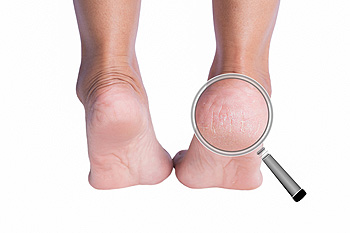Medical Causes of Cracked Heels
Tuesday, 17 October 2023 00:00
Cracked heels, though often viewed as a cosmetic concern, can be indicative of underlying medical issues. One common medical cause is dry skin or xerosis, which leads to the skin on the heels losing its moisture and elasticity, making it prone to cracking. Conditions such as eczema and psoriasis can exacerbate this dryness, intensifying heel fissures. Another medical culprit is athlete's foot, a fungal infection that can cause dry, flaky, and cracked skin not only on the feet but also between the toes. Peripheral neuropathy, a condition affecting nerve function, can lead to dry skin and decreased sweat production, contributing to heel cracking. Furthermore, systemic diseases like diabetes and thyroid disorders can impair skin health, making individuals more susceptible to cracked heels. Addressing the medical causes of cracked heels often involves treating the underlying condition. Additionally, practicing proper foot care, such as moisturizing and wearing appropriate footwear may help to manage cracked heels. If you have this condition, it is strongly suggested that you are under the care of a podiatrist who can offer prescribed medication as a successful treatment tool.
Cracked heels are unsightly and can cause further damage to your shoes and feet. If you have any concerns, contact Dawn Miles, DPM from Florida. Our doctor can provide the care you need to keep you pain-free and on your feet.
Cracked Heels
Cracked heels appear unappealing and can make it harder for you walk around in sandals. Aside from looking unpleasant, cracked heels can also tear stockings, socks, and wear out your shoes. There are several methods to help restore a cracked heel and prevent further damage.
How Do You Get Them?
Dry skin is the number one culprit in creating cracked heels. Many athletes, walkers, joggers, and even swimmers suffer from cracked heels. Age and skin oil production play a role to getting cracked heels as well.
Promote Healing
Over the counter medicines can help, especially for those that need instant relief or who suffer from chronic dry feet.
Wear Socks – Wearing socks with medicated creams helps lock in moisture.
Moisturizers – Applying both day and night will help alleviate dryness which causes cracking.
Pumice Stones – These exfoliate and remove dead skin, which allows for smoother moisturizer application and better absorption into the skin.
Change in Diet
Eating healthy with a well-balanced diet will give the skin a fresh and radiant look. Your body responds to the kinds of food you ingest. Omega-3 fatty acids and zinc supplements can also revitalize skin tissue.
Most importantly, seek professional help if unsure how to proceed in treating cracked heels. A podiatrist will help you with any questions or information needed.
If you have any questions, please feel free to contact one of our offices located in Palatka and Saint Augustine, FL . We offer the newest diagnostic and treatment technologies for all your foot care needs.









